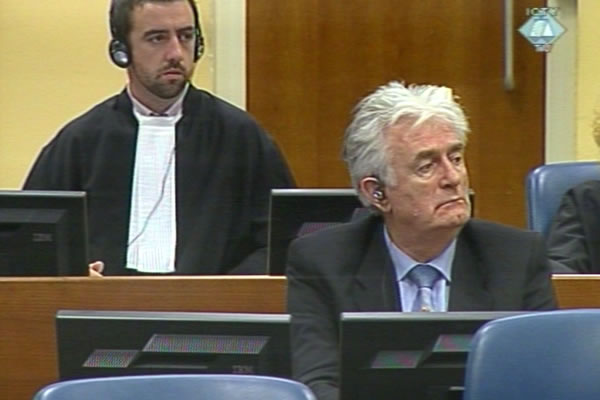Home
KARADZIC WILL NOT OPPOSE AMICUS CURIAE STATUS FOR VICTIMS
Radovan Karadzic will not oppose the request made by the genocide victims to be granted the status of amici curiae. Genocide survivors want to address the Appeals Chamber regarding the judgment delivered by the Trial Chamber after the prosecution rested its case, acquitting the former Republika Srpska president of genocide in seven BH municipalities
 Radovan Karadzic in the courtroom
Radovan Karadzic in the courtroom Radovan Karadzic will not oppose the motion filed by Satko Mujagic and Fikret Alic, two former prisoners of the Omarska, Keraterm and Trnopolje prison camps and the Association of Witnesses and Victims of Genocide from Sarajevo. The applicants want to be granted the status of amici curiae in order to be able to address the Appeals Chamber regarding the first-instance judgment that acquitted the former Republika Srpska president of genocide. If the judges should find their participation will contribute to a fair trial, Karadzic will not oppose the request, but if that is the case, Karadzic wants to be given 30 days to respond to the brief filed by the victims – amici curiae.
Last week, the applicants asked to be granted the status of amici curiae: they contend that as genocide survivors they have a ‘unique interest’ and the right to be heard before the Appeals Chamber. As they note in their motion, they, more than any other party in the proceedings, have "a human and historic appreciation and understanding of the consequences that will flow from this Tribunal's decision". The applicants are also aware of the "historical consequences of the outcome of this case" and the "lasting impact that this Tribunal's decision will have on the survivors and their descendants, and all the people of Bosnia and Herzegovina".
In a brief attached to the motion, the applicants note that the Trial Chamber’s decision to acquit Karadzic of genocide in the municipalities of Bratunac, Foca, Kljuc, Prijedor, Sanski Most, Vlasenica and Zvornik ran contrary to the genocide law contained in the Convention on the Prevention and the Punishment of the Crime of Genocide, and the Tribunal’s jurisprudence.
The motion also notes that three Trial Chambers in different cases ruled at the same stage that there was sufficient evidence allowing a reasonable trier of the facts to conclude that genocide was committed in Prijedor and other municipalities in 1992. The three Trial Chambers also concluded that the Bosnian Serb leadership headed by Karadzic possessed a specific genocidal intent.
About 100 associations and individuals who support the motion filed by Mujagic, Alic and the Association of Witnesses and Victims of Genocide are listed in the attachment. The applicants in this case are represented by the American law firm Freshfields Bruckhaus Deringer.Linked Reports
- Case : Karadzic
- 2012-08-31 GENOCIDE SURVIVORS SEEK AMICI CURIAE STATUS IN KARADZIC CASE
- 2012-08-28 KARADZIC INTENDS TO CALL 600 DEFENSE WITNESSES
- 2012-07-18 KARADZIC GRANTED LEAVE TO APPEAL
- 2012-09-11 KARADZIC SUBMITS REVISED WITNESS LIST
- 2012-09-19 KARADZIC HAS 300 HOURS FOR HIS CASE
- 2012-09-20 KARADZIC WANTS A SUBPOENA FOR CUTILEIRO
